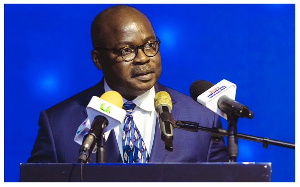 Dr. Ernest Addison, Bank of Ghana Governor
Dr. Ernest Addison, Bank of Ghana Governor
Ongoing fiscal and monetary stabilisation measures, following recent years of economic shocks that exposed the country’s structural vulnerabilities, are yielding positive results, Dr. Ernest Addison has said.
This recovery comes amid broader efforts in sub-Saharan Africa to stabilise after a period of turbulence, according to a keynote address delivered on behalf of Dr. Ernest Addison, Governor-Bank of Ghana, by Dr. Stephen Opata, Advisor to the Governor, at the WAIFEM/IMF Regional Course on Financial Programming and Policies.
In the address, Dr. Opata acknowledged that the region has faced significant challenges – particularly over the past four years, in which multiple shocks impacted fiscal stability. The economic turmoil, he noted, has left countries like Ghana in a precarious position, with limited policy space to respond.
“The shocks hit at a time countries had no policy space to respond, as fiscal positions in the sub-region had already deteriorated,” he explained.
For Ghana, the combination of pre-existing debt vulnerabilities and external shocks led to a series of crises; including a downgrade of the country’s sovereign credit rating and loss of international market access.
In response, government opted to seek assistance from the International Monetary Fund (IMF), embarking on a Fund-supported programme aimed at restoring macroeconomic stability. The programme has included a range of structural reforms designed to build resilience and promote inclusive growth.
One of the key areas of focus has been on monetary policy. The Bank of Ghana (BoG) took swift action to address rising inflation, tightening its monetary policy early in the crisis.
This approach, according to Dr. Opata, has been instrumental in reinforcing the disinflation process, with the BoG “mopping up excess liquidity within the banking sector” and avoiding monetary financing of the budget. These actions were aimed at reducing price pressures and stabilising the currency.
The Bank also prioritised maintaining exchange rate flexibility, a move that has contributed to a build-up of reserves and enhanced the country’s resilience to external shocks.
Additionally, BoG established the Ghana Financial Sector Fund (GFSF) with support from the World Bank and Ghanaian government to provide further stability for the financial sector.
These measures are beginning to show positive results. Real GDP growth in the first quarter of 2024 came in at 4.7 percent, with the industrial sector leading the way at a 6.8 percent growth rate.
Furthermore, inflation – which peaked at 54.1 percent in December 2023 – had dropped to 20.4 percent by August 2024, signalling a faster-than-expected deceleration. This reduction in inflation has been attributed to strong policy measures and effective liquidity management by BoG.
The country’s fiscal policy has also aligned with the IMF-supported programme, contributing to the broader recovery. The banking sector, which had suffered from adverse effects of the Domestic Debt Exchange Programme (DDEP), is now stable, liquid and profitable.
Significant profits were recorded in 2023, helping to offset the losses experienced in 2022 and signalling improved confidence in the sector.
Dr. Opata also highlighted improvements in Ghana’s gross international reserves, which stood at US$6.9billion by end of June 2024, up from US$5.9billion at the close of 2023.
This reserve level represents 3.1 months of import cover, further demonstrating the progress made in stabilising the economy.
However, Dr. Opata warned that the recovery remains fragile and ongoing risks could threaten the gains made so far.
He pointed to the possibility of weaker external demand, especially if growth in major economies like China and the U.S. falters, as well as the potential for rising geopolitical risks to disrupt global oil markets – which could impact Ghana’s foreign exchange reserves and inflation.
Despite these risks, the overall outlook for Ghana’s economy is one of cautious optimism. With inflation on the decline, growth rebounding, and the financial sector recovering, the country is on a path toward stabilisation.
As Dr. Opata remarked, “These measures are beginning to yield concrete results”, signalling that Ghana’s fiscal and monetary policies are taking hold and positioning the country for a more stable economic future.
The focus is now on ensuring that the recovery is sustainable, with fiscal adjustments needed to rebuild buffers without jeopardising growth. As the Bank of Ghana continues to implement these policies, the country is better-positioned to navigate future challenges and lay the groundwork for long-term economic resilience.